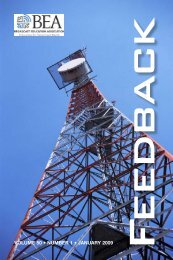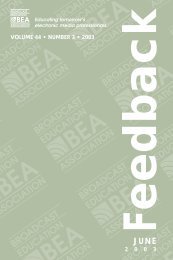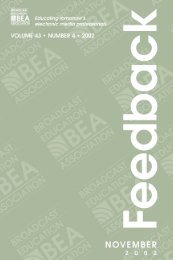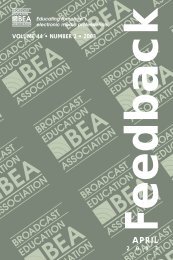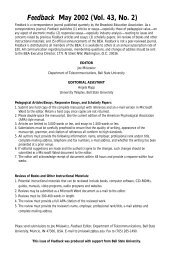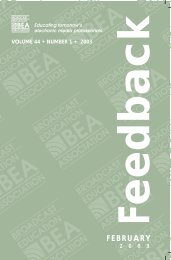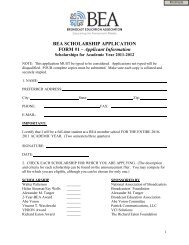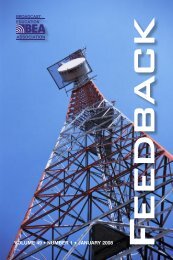PLANNING FOR GROWTH IN YEARS OF RESTRICTED RESOURCES
Feedback September 2003 - Broadcast Education Association
Feedback September 2003 - Broadcast Education Association
Create successful ePaper yourself
Turn your PDF publications into a flip-book with our unique Google optimized e-Paper software.
RESEARCHNON-COMMERCIAL BROADCASTERCHOICES UNDER THE NEW RULES <strong>FOR</strong>POLITICAL TIMEMaria Fontenot, University of Tennesseemfonteno@utk.eduMark D. Harmon, University of Tennesseemdharmon@utk.eduBenjamin Bates, University of Tennesseebjbates@utk.eduAbstractThe researchers take note of a dramatic shift in the law regarding political time andnon-commercial broadcasters. During the 1990s court decisions and FCC rulings werecreating an environment where it appeared non-commercial stations, in manyinstances, may be obliged to carry candidate-created commercial messages. InDecember 2000, Congress changed Section 312a7 of the Communication Act of 1934.The new law effectively exempted non-commercial broadcasters from a requirement tocarry messages from federal candidates.Using a Corporation for Public Broadcasting list, the researchers surveyed 558managers of non-commercial stations. A total of 221 managers responded, 79 from TVstations and 142 from radio stations. The law had its intended effect. The airednumber of candidate-created spots and candidate statements from federal candidatesfell dramatically between 2000and 2002 on the nation’s non-commercial airwaves.Surprisingly, fewer than half the stations had written policies regarding candidatematerial. More than eleven percent indicated a willingness to sell an underwritingcredit to candidates, and more than six percent already had.By a four-to-one ratio most stations conducted special election-relatedprogramming. The managers also shared some stories of very unusual candidaterequests for air time. Some managers indicated a desire to be able to exclude nonseriousthird-party candidates from programs.ArticleThe U.S. Congress through the Federal Election Campaign Act of 1971 effectivelyamended the Communication Act of 1934 starting with the 1972 election cycle. Therevised Section 312(a)(7) reads, “The Commission [Federal CommunicationsBEA—Educating tomorrow’s electronic media professionals 40



